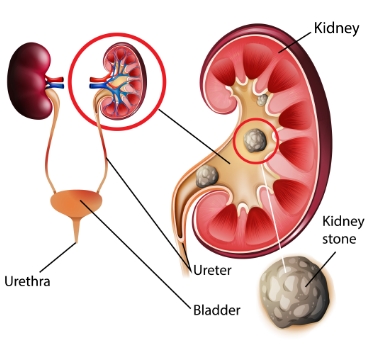Bladder Stones
What are bladder stones?
Bladder stones are solid masses of crystalized minerals which form in the bladder, typically when the bladder cannot empty fully. Similarly, to kidney stones and other urinary tract blockages, they can result in severe pain, infections, and difficulty urinating if left untreated.
Sandhurst Urology offers diagnosis, management, and medical intervention for bladder stones from our clinic in Bendigo. To book an appointment, please ask your GP for a referral or call us directly.

Symptoms of bladder stones
Not all bladder stones present with symptoms, particularly if they are small enough for the body to pass out through urine. If symptoms do develop, they may include:
- Dark, cloudy, or unusually smelling urine
- Blood in the urine
- Increased frequency of urination (particularly at night)
- Pain during urination (typically a burning sensation)
- Lower abdominal pain, particularly at the end of voiding, with often sudden onset
- Pain in or around the penis (in men)
- Difficulty urinating or an interrupted stream
- Frequent urinary tract infections
- Inability to urinate unless your body is in a certain position
Remember that your own experience with bladder stones is individual – you may not experience every symptom and may experience slightly different symptoms to those specified. For further advice and diagnosis, book an appointment at Sandhurst Urology.
How bladder stones are diagnosed
As their symptoms may broadly overlap with other urologic conditions – such as ureteric obstructions and some bladder tumours, bladder stones are generally diagnosed using multiple tests.
If your GP or urologist suspects bladder stones, they may request some of the following tests:
- Urine culture – bladder stones by definition are likely to be colonised with bacteria
- Blood tests – if your bladder stone accompanies an infection, a blood test may detect it and inform how it is treated. Understanding your kidney function is important.
- CT scans – these may show bladder stones in more detail than a typical x-ray. A spiral CT scan may be requested in particular, which may show concerns in the bladder or elsewhere in the body.
- Renal tract ultrasound – this test uses sound waves to create an image of your bladder and other urinary tract and pelvic structures. It may let your doctor spot a bladder stone and assess its size.
- Cystoscopy – a thin, fibre-optic tube with a camera attached is passed into your bladder through your urethra, letting your urologist visually inspect the inside of your bladder on a screen.
Preventing bladder stones
As bladder stones are thought to develop when urine remains in the bladder for longer than it should, you may be able to prevent them by urinating regularly and ensuring that your bladder is fully empty. In addition to specific advice provided by your medical team, the following strategies may help you accomplish this:
- Drinking water – increasing your water intake to 2-3 litres daily helps your body produce more urine, causing you to urinate more regularly and flush stone-forming products from your body.
- Emptying your bladder fully – after urinating, you may wish to wait 10-20 seconds and try again to ensure the bladder is completely empty. Specialist equipment at Sandhurst Urology allows assessment of bladder function including voiding pressures and post void residual.
- Getting regular prostate checks – particularly in men over age 50, prostate enlargement can cause difficulty emptying the bladder. As a result, having regular prostate examinations and treating any concerns may help prevent bladder stones.
- Seeking treatment for other bladder conditions – conditions such as neurogenic bladder, small capacity bladder, and other bladder function disorders can cause urinary retention and lead to bladder stones. If you suspect a bladder concern, speak to one of our Bendigo urologists for treatment.
As with any condition, always seek medical guidance to prevent and treat bladder stones effectively. Ask your GP for a referral to Dr Rohan Hall at Sandhurst Urology for individualised advice.

Treatments for bladder stones
Many bladder stones pass without needing treatment, though some larger stones cannot leave the body without assistance. To prevent further stones from forming, you may also require treatments to address the stone’s underlying cause. These may include:
- Managing kidney stones – in rare cases, bladder stones result from kidney stones which are unable to pass completely. Your doctor or urologist may prescribe medications or lifestyle changes to prevent these from forming. Learn more about kidney stone management.
- Managing prostate enlargement – prostate enlargement can contribute to bladder stones by restricting the urethra and trapping urine inside the bladder. Your medical team may recommend medications or procedures to reduce its size and promote better urine flow.
- Intermittent catheterisation – if you are unable to drain your bladder completely, your doctor may recommend using a urinary catheter to drain it every now and then. Professionals at Sandhurst Urology will train you on how to do this at home.
- Using a pessary – in cases where urinary retention is caused by the bladder’s walls weakening and dropping into the vagina, your doctor may prescribe a pessary. This is a small, specialist-fitted ring which is worn inside the vagina to hold the bladder in position.
Medical Interventions for bladder stones
The most common procedure for treating bladder stones is cystolitholapaxy. It involves your urologic surgeon passing a cystoscope into your bladder – usually through the urethra – and using its attached camera to look for stones. Once they are located, the urologist is able to break the stones into small fragments which are removed. Occasionally the stone is too large for this minimally invasive approach and you may require an open cystlithotomy. The is a small cut in the lower abdomen to gain access to the ladder stone.
In addition to addressing the stone, you may also need surgery to address its cause and prevent future stones from developing. Procedures used to do this may include:
- Bladder augmentation or reconstruction – If your bladder cannot fully empty due to a shape defect or some types of function disorder, your surgeon may recommend surgery to reshape it.
- Benign prostate hyperplasia (BPH) management – your surgeon may recommend a procedure to reduce your prostate’s size, improving your ability to pass urine. Sandhurst Urology performs transurethral resection of the prostate (TURP), UroLift, and bladder reconstruction as potential surgical treatments. Please note that we do not offer Rezume, HoLEP, or GreenLight laser procedures.
- Prostate cancer management – prostate cancer may enlarge the prostate and prevent urine from leaving the bladder. Learn more about Sandhurst Urology’s treatments for prostate cancer.
- Neurogenic bladder management – managing bladder nerve function may contribute to better emptying and less risk of stones. Sandhurst Urology provides medical and surgical interventions, including Botox injections.
Providing Excellent Urological Care of the Highest Standards
Book a consultation with Sandhurst Urology today